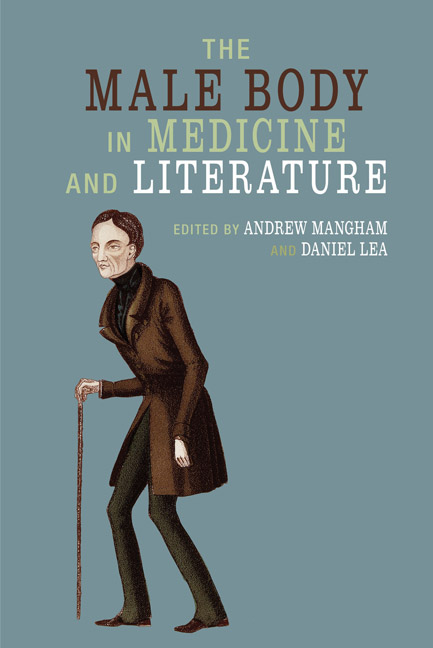Book contents
- Frontmatter
- Contents
- Acknowledgements
- Notes on Contributors
- Introduction
- Part One Enquiry and Experimentation
- Part Two Wounded and Psychopathologised Bodies
- 5 The Male Wound in Fin de Siècle Poetry
- 6 The Cacophony of Disaster: The Metaphorical Body of Sound in Don DeLillo's Falling Man
- 7 ‘Human Nature is Remorseless’: Masculinity, Medical Science and Nervous Conditions in Virginia Woolf's Mrs Dalloway
- 8 ‘A man must make himself’: Hypochondria in Maria Edgeworth's Ennui
- Part Three Fear, Confusion and Contagion
- Index
8 - ‘A man must make himself’: Hypochondria in Maria Edgeworth's Ennui
from Part Two - Wounded and Psychopathologised Bodies
- Frontmatter
- Contents
- Acknowledgements
- Notes on Contributors
- Introduction
- Part One Enquiry and Experimentation
- Part Two Wounded and Psychopathologised Bodies
- 5 The Male Wound in Fin de Siècle Poetry
- 6 The Cacophony of Disaster: The Metaphorical Body of Sound in Don DeLillo's Falling Man
- 7 ‘Human Nature is Remorseless’: Masculinity, Medical Science and Nervous Conditions in Virginia Woolf's Mrs Dalloway
- 8 ‘A man must make himself’: Hypochondria in Maria Edgeworth's Ennui
- Part Three Fear, Confusion and Contagion
- Index
Summary
Maria Edgeworth's Ennui (1809), the first volume of her Tales of Fashionable Life, begins with its hero, Lord Glenthorn, explaining, ‘Whilst yet a boy, I began to feel the dreadful symptoms of that mental malady which baffles the skill of medicine, and for which wealth can purchase only temporary alleviation. For this complaint there is no precise English name; but, alas! the foreign term is now naturalized in England.’ He goes on to describe his symptoms, some of which include ‘restlessness of body and mind’ and ‘apathy’. In attempts to justify the life of dissipated luxury that he will subsequently relate, the Irish-born and English-educated Glenthorn details various attempts to cure his distemper according to the most current fashion. These failed attempts and Glenthorn's linking them to examples of foreign tyranny and failed patriarchy represent the malady as a moral failure. However, exposure to a distinctly Irish character provides an alternative that highlights the value of domestic affection and makes clear Edgeworth's unique definition of masculinity. Ultimately, the novel argues that a man must be defined according not to his activities abroad but to his relationships at home.
Much critical work has been done to situate Ennui within the context of revolutionary Ireland and to determine Edgeworth's politics. Marilyn Butler's introduction to her 1992 edition of Castle Rackrent and Ennui, for example, argues that ‘Glenthorn acts for the Anglo-Irish ruling order’ and that the Rebellion and Union are ‘actually the tale's unspecified axis’. More recently, however, Robert Tracy has argued that Ennui suggests: ‘the commitment to Irish tradition … or an unhyphenated Irish identity’. In this essay, my intention is to define Ennui's contributions to the notion of an ‘unhyphenated Irish identity’ according to two preliminary considerations. The first is the work Irene Beesemyer has already done to explore the important connection between Glenthorn's ‘clinical boredom’ and his masculinity. Describing the Revolutionary context of Wollstonecraftian feminism as a blow to traditional models of masculinity, Beesemyer builds upon Marilyn Butler's observations about Edgeworth's knowledge of contemporary medical discourse to explore Glenthorn's emasculation. Specifically, Beesemyer reads each failed remedy as an impotent yearning for sexual release, and she ultimately concludes that Glenthorn's cure represents a new model of masculinity, the ‘“bourgeois aristocrat,” a man potentiated no longer by birth, titles, lands, or God’.
- Type
- Chapter
- Information
- The Male Body in Medicine and Literature , pp. 137 - 156Publisher: Liverpool University PressPrint publication year: 2018



